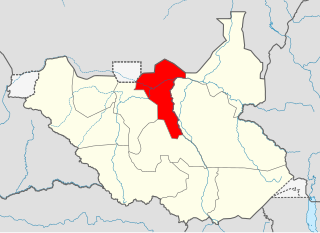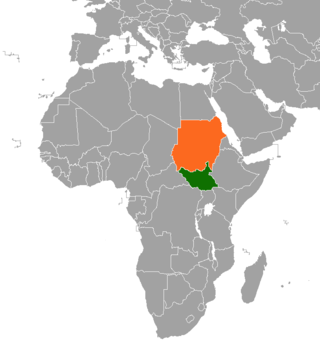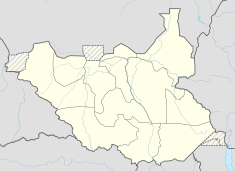
Chevron Corporation is an American multinational energy corporation predominantly specializing in oil and gas. The second-largest direct descendant of Standard Oil, and originally known as the Standard Oil Company of California, it is active in more than 180 countries. Within oil and gas, Chevron is vertically integrated and is involved in hydrocarbon exploration, production, refining, marketing and transport, chemicals manufacturing and sales, and power generation.

Unity State, also known as Western Upper Nile, is a state in South Sudan. Unity State is in the Greater Upper Nile region. Unity is inhabited predominantly by two ethnic groups: the Nuer majority, and the Dinka minority.

The Justice and Equality Movement is an opposition group in Sudan founded by Khalil Ibrahim. Gibril Ibrahim has led the group since January 2012 after the death of Khalil, his brother, in December 2011. The JEM supported the removal of President of Sudan, Omar al-Bashir and nation-wide government reform.

The China National Petroleum Corporation (CNPC) is a major national oil and gas corporation of China and one of the largest integrated energy groups in the world. Its headquarters are in Dongcheng District, Beijing. CNPC was ranked fourth in 2022 Fortune Global 500, a global ranking of the largest corporations by revenue.

Bentiu, also spelled Bantiu, is a city in South Sudan. It is the capital of Unity State.
Heglig, or Panthou, is a small town at the border between the South Kordofan state of Sudan and the Unity State in South Sudan. The entirety of Heglig is claimed by both Sudan and South Sudan, but administered by Sudan. The area was contested during the Sudanese Civil War. In mid-April 2012, South Sudan's Sudan People's Liberation Army (SPLA) captured the Heglig oil field from Sudan. Sudan took it back at the Second Battle of Heglig ten days later.

China–Sudan relations are the bilateral relations between the People's Republic of China and the Republic of Sudan. China is currently one of Sudan's largest trade partners, importing oil and exporting low cost manufactured items as well as armaments into the country. Both states enjoy a very robust and productive relationship in the fields of diplomacy, economic trade, and political strategy. They formally established diplomatic relations on February 4, 1959, when Sudan formally recognized the sovereignty of the People's Republic of China and have since become close global allies, supporting each other in times of internal crises and international controversy such as during the Second Sudanese Civil War, the Darfur Crisis, and the Xinjiang Conflict. China continues to provide massive support to Sudan by developing its oil resources and supplying millions of dollars in loans, aid, foreign direct investments, and humanitarian assistance. In return, Sudan has become a reliable political and economic ally in the international arena, allowing China to maintain a significant stake in its oil sector.
The Cyrenaican desert campaign was a military campaign that initiated in April 2011 by the Libyan military in the form of hit-and-run attacks against rebel-held towns and oil facilities in the eastern Libyan Desert, during the Libyan Civil War. The campaign failed in denying anti-Gaddafi forces control of southern Cyrenaica.
Leer is a town in the Leer County of Unity State in the Greater Upper Nile region of South Sudan. It is the capital of Leer County and was the capital of the former Southern Liech State. It is the most densely populated county in South Sudan.

The Adar oilfield, also known as the Adar Yale, Adar Yeil or Adaril field, is an oilfield situated in the Melut in South Sudan estimated to contain about 276 million barrels (43,900,000 m3) of oil. The Chevron Corporation discovered the Adar Yale field in 1981, shortly before the start of the Second Sudanese Civil War (1983–2005). Soon after Chevron had suspended operations in 1984, Sudanese government troops began attacking civilian settlements in the area, burning the houses and driving the people away, and in the late 1990s, Nuer militias from Nasir helped the army in clearing away the people to make way for the roads and infrastructure of the oilfield.
Mayom County is an administrative division of Unity State in the Greater Upper Nile region of South Sudan. It is located to the west of Bentiu. The county headquarters is Mayom town.

Block 5A is an oil concession in South Sudan. After oil field development began during the Second Sudanese Civil War, Block 5A was the scene of extensive fighting as rival militias struggled for control. Out of an original population of 240,000, an estimated 12,000 were killed or died of starvation and 160,000 were displaced by force. Production started in 2006. There is evidence that the environmentally sensitive marshlands beside the Nile are becoming polluted.
Adok is a port on the White Nile in the Leer County of Unity State in the Greater Upper Nile region of South Sudan. In the early 1980s Chevron Corporation found oil in Adok.
Angelina Jany Teny is a South Sudanese politician who served as Minister of Defence since March 2020.

The Heglig Crisis was a brief war fought between the countries of Sudan and South Sudan in 2012 over oil-rich regions between South Sudan's Unity and Sudan's South Kordofan states. South Sudan invaded and briefly occupied the small border town of Heglig before being pushed back by the Sudanese army. Small-scale clashes continued until an agreement on borders and natural resources was signed on 26 September, resolving most aspects of the conflict.

The Ruweng Administrative Area is an administrative area in South Sudan. The area was known as Ruweng State between 2 October 2015 and 22 February 2020 when it was a state of South Sudan.
The petroleum industry in Sudan began in 1979, when the first commercial flow in the country occurred.
This article lists events in 2021 in South Sudan.
The Nile Petroleum Corporation (Nilepet) is the national oil and gas company of the nation of South Sudan. It was incorporated in 2009 by the government of Sudan and transferred to the government of South Sudan in 2011. Nilepet is the successor company in South Sudan to Sudapet, the national oil and gas company of Sudan.

On 29 January 2025, a Beechcraft 1900D operated by Eagle Air on behalf of Light Air Services crashed in Unity State, located in the Greater Upper Nile region of South Sudan. The aircraft was on a routine scheduled charter flight from GPOC Unity Airstrip to Juba International Airport when it crashed shortly after takeoff, killing 20 out of 21 onboard. The aircraft was transporting oil workers to the South Sudanese capital Juba.










